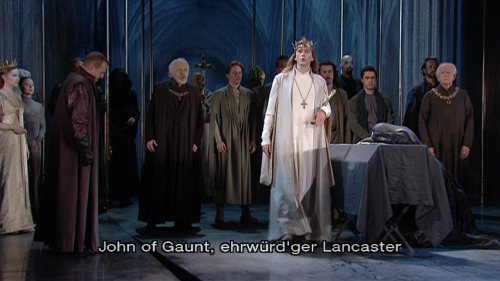shredsandpatches:percyhotspur:Richard II German translation, part 1/???I wasn’t able to post this li
shredsandpatches:percyhotspur:Richard II German translation, part 1/???I wasn’t able to post this like I wanted so here we goFirst Cap:Richard: ,,John of Gaunt, ehrwürd’ger Lancaster.” John of Gaunt, time-honored Lancaster.Original: “Old John of Gaunt, time-honored Lancaster.”This is interesting because the translator apparently forgot how to German in the first sentence of the play. Impressive. The “of” was not translated to ,,von” in this case. Why? I don’t know. Also, ,,ehrwürd’ger” can mean venerable/respected/etc. But it also can be translated as “time-honored,” so I’m going with that. I love it when the translation does the work for me.Second Cap:Richard: ,,Hast du nach Schwur und Pfand hiehergebracht Henry Hereford, deinen Kühnen Sohn” Have you in vow and pledge brought hither Henry Hereford, your bold son.Original: Hast thou, according to thy oath and band, brought hither Henry Hereford thy bold son”Pretty straightforward translation. The long word ,,hiehergebracht” is the result of combining ,,hieher,” “hither” and ,,gebracht,” the past tense of “brought.” Note the ,,hast” at the beginning, this sentence is actually in the past tense. So it could also be translated as “Did you bring your upstart loser son here like you promised?” (paraphrasing Richard).Third Cap:Richard: ,,Von jüngst die heft´ge Klage zu bewähren, die gleich zu hören Muße uns gebrach wider den Herzog Norfolk, Thomas Mowbray?” To prove the recent vehement suit that’s equally brought to hear at our leisure against the Lord Norfolk, Thomas Mowbray?Original: “Here to make good the boisterous late appeal, which then our leisure would not let us hear against the Duke of Norfolk, Thomas Mowbray?”Hoo boy. This gave me the worst trouble that a translation has in a long time. First off, this sentence isn’t in the negative at all. Or if it is, I couldn’t pick up on it. I’m not even sure my translation makes sense in English. Also, does anyone who speaks Shakespeare know if the German is in iambic pentameter?I only speak a little bit of German but it does indeed appear to be in iambic pentameter!Also, I think “John of Gaunt” is entirely in English because “of Gaunt” is functionally his surname. We don’t translate particles like de or von to “of” when they appear in foreign-language names, after all (thus “Leonardo da Vinci,” not “of Vinci”), and the only reason we don’t really see it the other way round is because English surnames don’t really have “of” in them: English surnames associated with places generally just drop the of. Probably someone with an actual linguistics background could explain this properly rather than just noticing it – perhaps it has to do with the upper classes at the time in history when surnames were becoming a thing being largely French-speaking? I dunno.**Possibly pertinent: even looking at the surnames** of characters in the play, the ones associated with foreign locales have an of (John of Gaunt, Richard of Bordeaux) while those associated with English locales (Edmund Langley, Henry Bolingbroke) don’t. But irl this wasn’t consistent either.**As opposed to titles. Although the English royal family name is usually given as Plantagenet for pretty much everyone between Henry II and Richard III, they didn’t use it during this period – it was revived by Richard Plantagenet, Duke of York, to emphasize his claim to the throne. So most members of the royal family used surnames based on their birthplaces. Sorry, I know I have gotten way off topic by now.Actually, the “of Gaunt” does make sense now that you put it that way. I was already thinking in German so when I saw that it was weird. And that’s awesome that it seems to be in pentameter! Actually your discussion of the names is fascinating! Thanks for adding it! And yeah we’ll see how they handle the Gaunt jokes. Hopefully I’ll do a post about this long a day? At that rate I’ll finish the project when I’m in a nursing home but hey. -- source link
#long post



